THEsixthform@oaklandscatholicschool.org 02392 259214

Thank you for your interest in joining the Sixth Form at Oaklands Catholic School. It is a privilege to lead this wonderful community and I do hope you will consider joining our flourishing and successful Sixth Form. Mr M Quinn Headteacher Choosing the right post-16 pathway can be challenging, and the information in this brochure is designed to give you an overview of the wide variety of courses we offer. The Sixth Form is a thriving community rooted in a culture of love and service where people grow and develop whilst feeling cared for and valued. At the heart of the Sixth Form and wider school lies our Catholic ethos, which underpins everything we do, as our excellent student feedback, public examination results, and post-16 destinations testify. Recently, this has included Oxbridge success and a record number of students securing places to study medicine and other courses at leading universities. I am also proud of the growing number of post18 apprenticeships our students have accessed across leading industries. The Sixth Form allows every student to achieve their full potential through high-quality education and academic success. Small class sizes and designated tutors enable us to identify each student’s gifts and find opportunities to develop them in a climate where shared and personal achievement can be maximised, where difference is not just tolerated but celebrated. Matthew Quinn, Headteacher
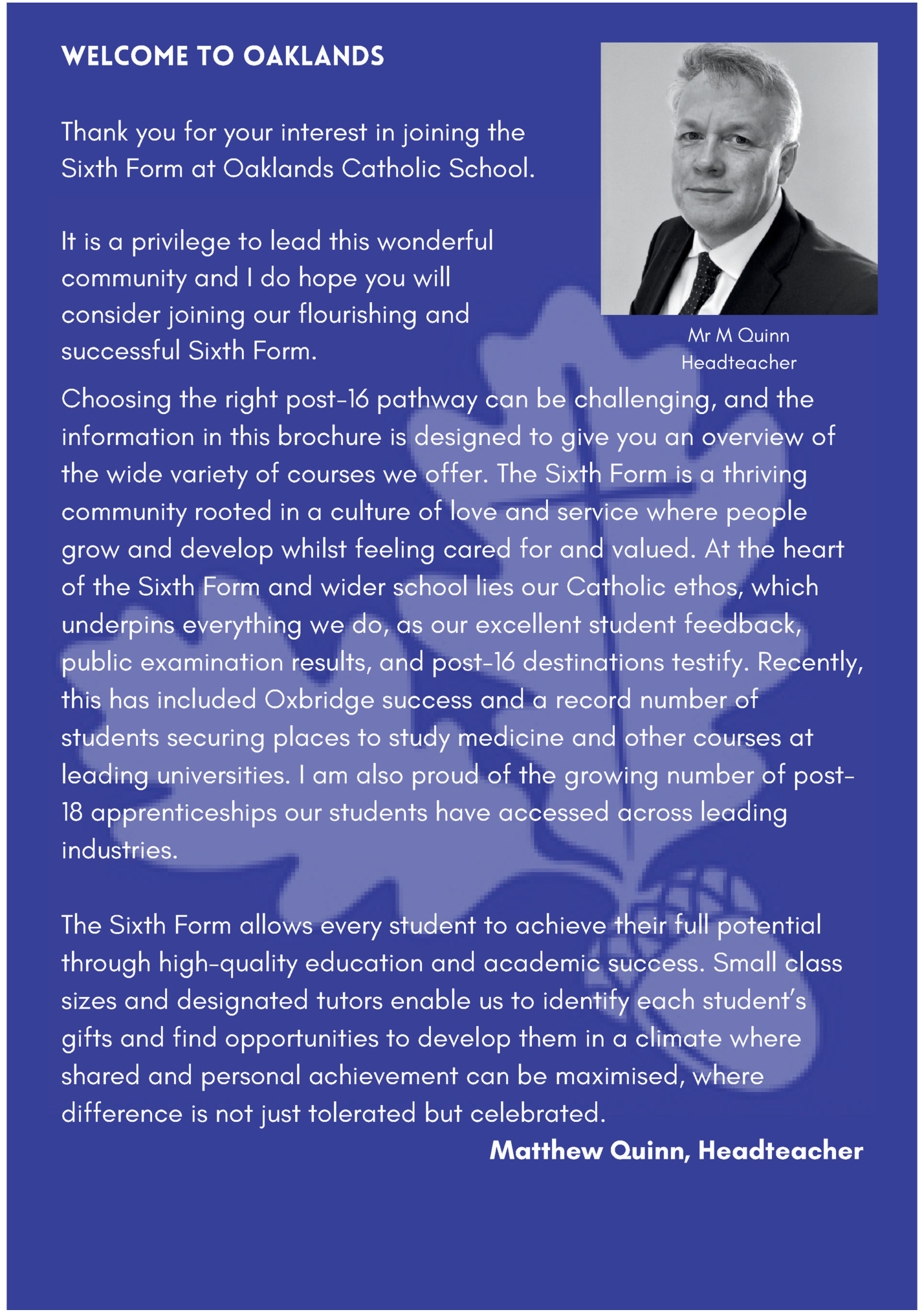
A very warm welcome to Oaklands Sixth Form College! Thank you for your interest in exploring us as a possible destination for your post-16 studies. We welcome students from Oaklands Mr D Godwin and a wide range of other schools. Director of Sixth Form Your time in Sixth Form is a unique yet surprisingly short. It bridges the world of compulsory schooling and university study or employment. You will have many unique opportunities and challenges, but you can be confident that if you join Oaklands Sixth Form you will be guided and supported throughout your journey by highly experienced and committed teachers and support staff. Deciding on your next steps after GCSE can be daunting, and I hope you find the following information useful. Please don't hesitate to contact us directly if you have any questions. Dave Godwin, Director of Sixth Form

The minimum grade requirements for entry to the Sixth Form are 5 grades 9-4 at GCSE, including Maths and English. However, specific entry requirements vary according to the subject, so please refer to the following course information. Please note that whilst our brochure outlines a wide range of subjects we have recently offered, we reserve the right not to run a particular course in any given year, depending upon demand and staffing. Application process Application form online October onwards Open Evening 17th October Confirmation Letter November onwards Applicant ‘Taster’ Days August 2025 Induction and Courses Start 3 July 2025 GCSE Results and Enrolment September 2025
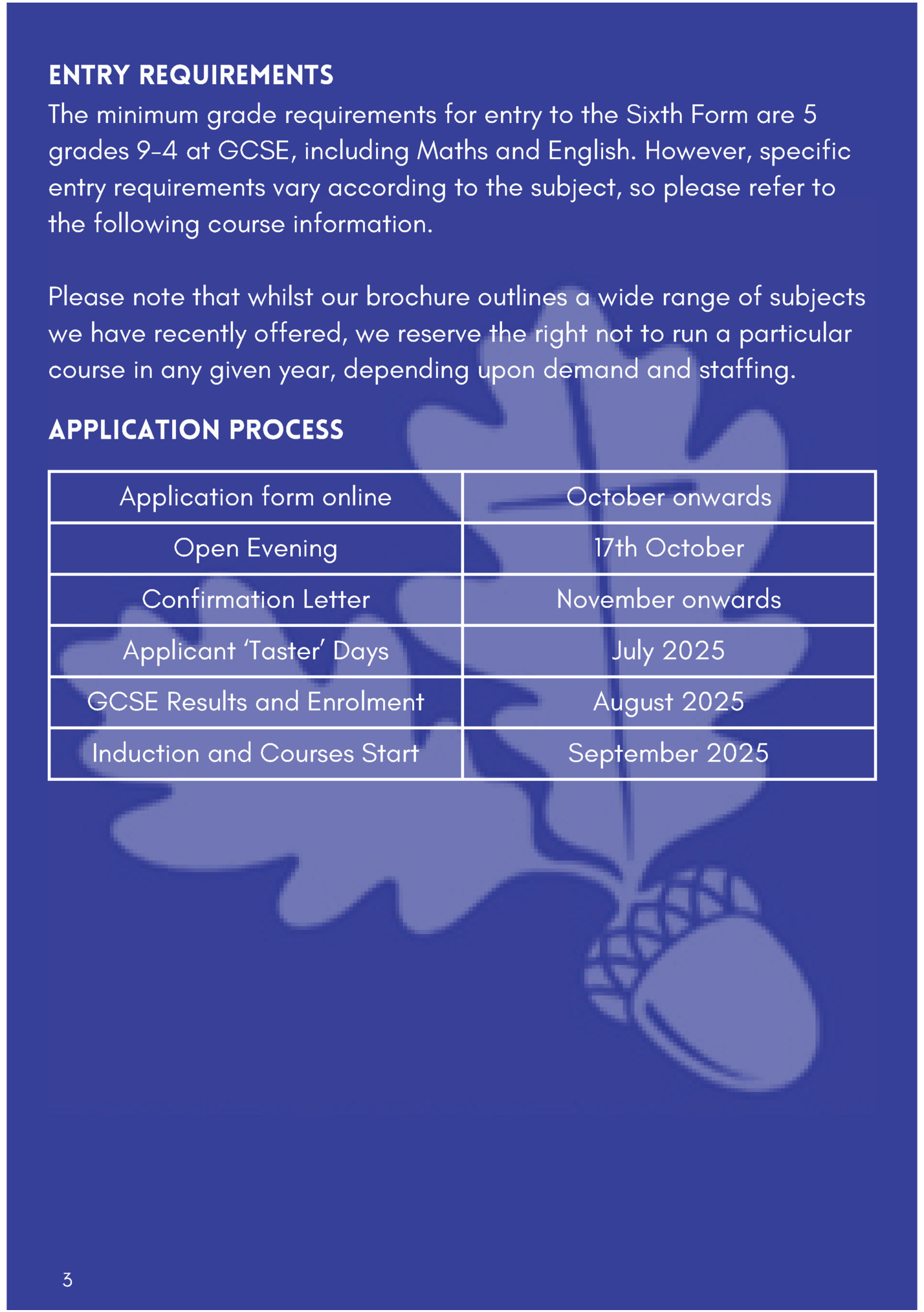
(Exam Board: AQA) Aims of the Course Gain intellectual, imaginative, creative and intuitive powers. Develop investigative, analytical, experimental, technical, expressive skills, aesthetic understanding and creative judgement. Independence of mind to develop their own ideas. Gain experience working with a broad range of media. Build an understanding of the interrelationship between art, craft and the design processes and an awareness of the contexts in which they operate. Units/Topics Year 1: Unit 1: Coursework Portfolio Unit 2: Controlled Assignment Year 2: Unit 3: Personal Investigation Unit 4: Controlled Assignment assessment - AQA Unit 1 & Unit 2: Internally assessed Unit 3: 60% of A Level. Project and 10003000 word essay Unit 4: 40% of A Level. 15-hour controlled test specific entry requirements A minimum of 5 GCSE grades 9–4 including Maths and English and a GCSE in Art, Textiles or Design Technology. Any student wishing to study Art or Photography without a GCSE in Art, must submit a portfolio of their private work before acceptance on to the course. Link Subjects Art may be taken with any other subject. TYpes of Learning Experience Students will study a series of projects in Year 12 to develop their skills and two further units in Year 13. Individual skills, techniques and knowledge are gained through lectures, discussion, practical work, videos, gallery visits, seminars, books and contact with local art colleges. Visits to London galleries are organised in preparation for personal studies. Progressing to higher education: Art and Design - Fine Art/Photography is an exciting and stimulating subject. It is a recognised A Level subject for entry to university degree courses and also predegree foundation courses. Careers: Art and Design - Fine Art/Photography is especially relevant for those wishing to pursue a wide range of careers including fashion, industrial design, interior design, graphic design, textiles, printmaking, theatre, film, media, T.V., photography, hairdressing, jewellery making, animation, art therapy, art education, museum curator, art conservation, product design, illustration and architecture. 4
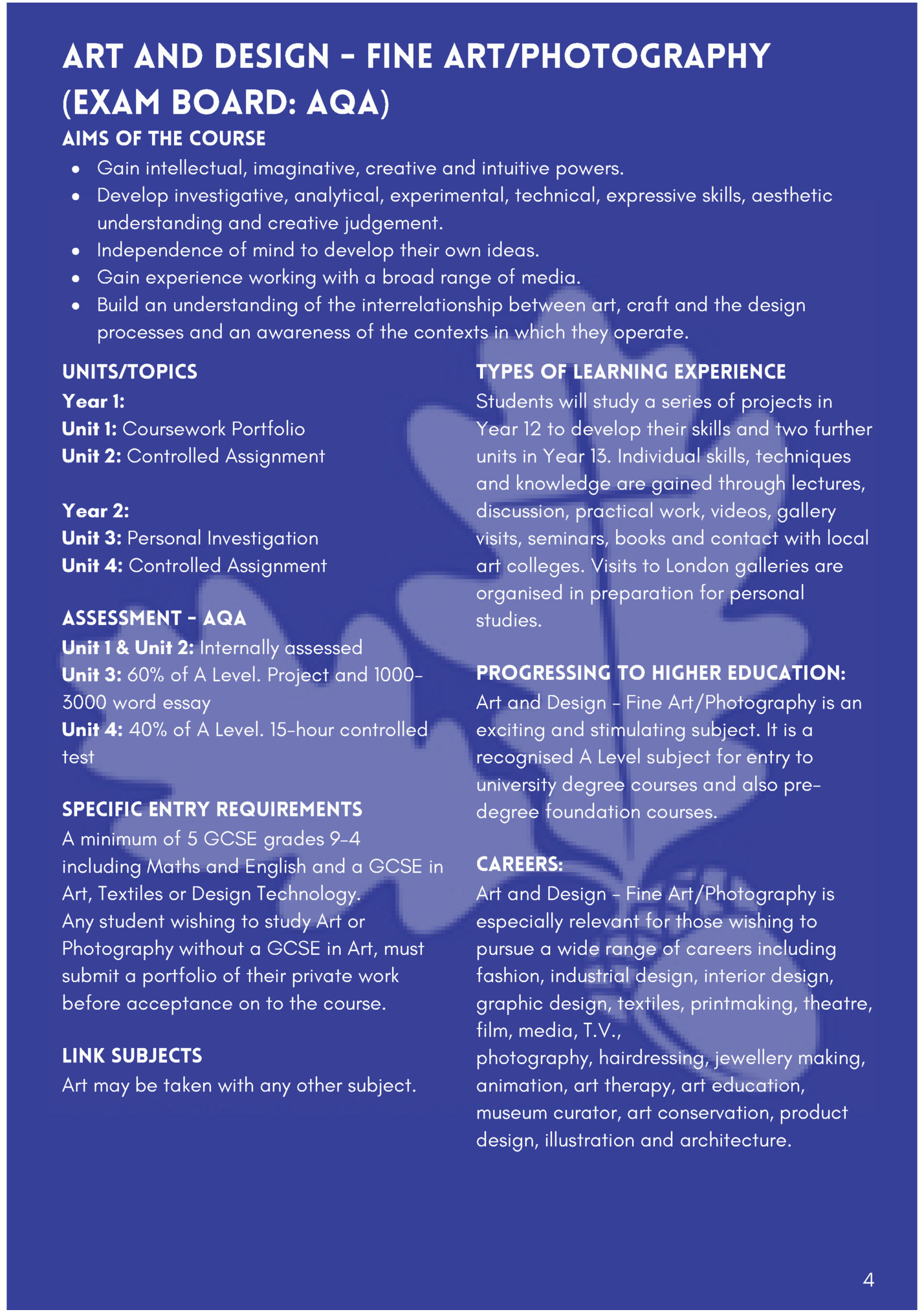
Aims of the Course Enhance knowledge and understanding of living things, how they work and interact and how they are used and influenced by humans. Develop study and communication skills. Improve planning, practical, analytical and evaluation skills. Develop a more flexible and versatile approach for using biological principles in explaining observations. Apply knowledge, understanding and skills for use in higher education, careers and everyday life. Develop skills which enhance their ability to participate more effectively in adult life. Units/Topics Year 1: Biological Molecules; Cells; Genetic Information, Variation and Relationships between Organisms; Organism Exchange with the Environment Year 2 Energy Transfer in and Between Organisms; How Organisms Respond to Changes in Their Environment; Genetics, Populations, Evolutions and Ecosystems; The Control of Gene Expression maths skills: 10% of the marks in each exam will come from Maths skills. Includes: interpretation of data and statistical tests 12 required assessed practicals: Enzymes; Mitosis; Dissection (Animal/Plant Gas Exchange System); Growing Microbes; Chromatography; Animal Behaviour, Rate of Respiration of Yeast Cultures; Species Diversity and Distribution specific entry requirements Level 6+ in English, Maths and Combined Science or Level 6+ in English, Maths, Science. 5 Link Subjects Biology is a good partner for any subject but links particularly well with Chemistry, Geography and PE. types of learning experience Practical work: microscopes, fieldwork, dissection (optional), projects, modelmaking. Written work: investigation reports, essays, practice exam questions, data-handling. Discussion: lecture-style, presentations, conference. Reading Progressing to higher education: Biology is recognised for its rigour as an A Level subject suitable for entry to university and higher education, and particularly useful for continuing studies in any Science related area. Careers: Essential or useful for medicine, veterinary science, dentistry, biochemistry, marine biology, nature conservation, pharmacy, physiology, nursing, occupational therapy, sports science, physiotherapy, medical and research laboratory technician, forensic sciences, dietician and many others.
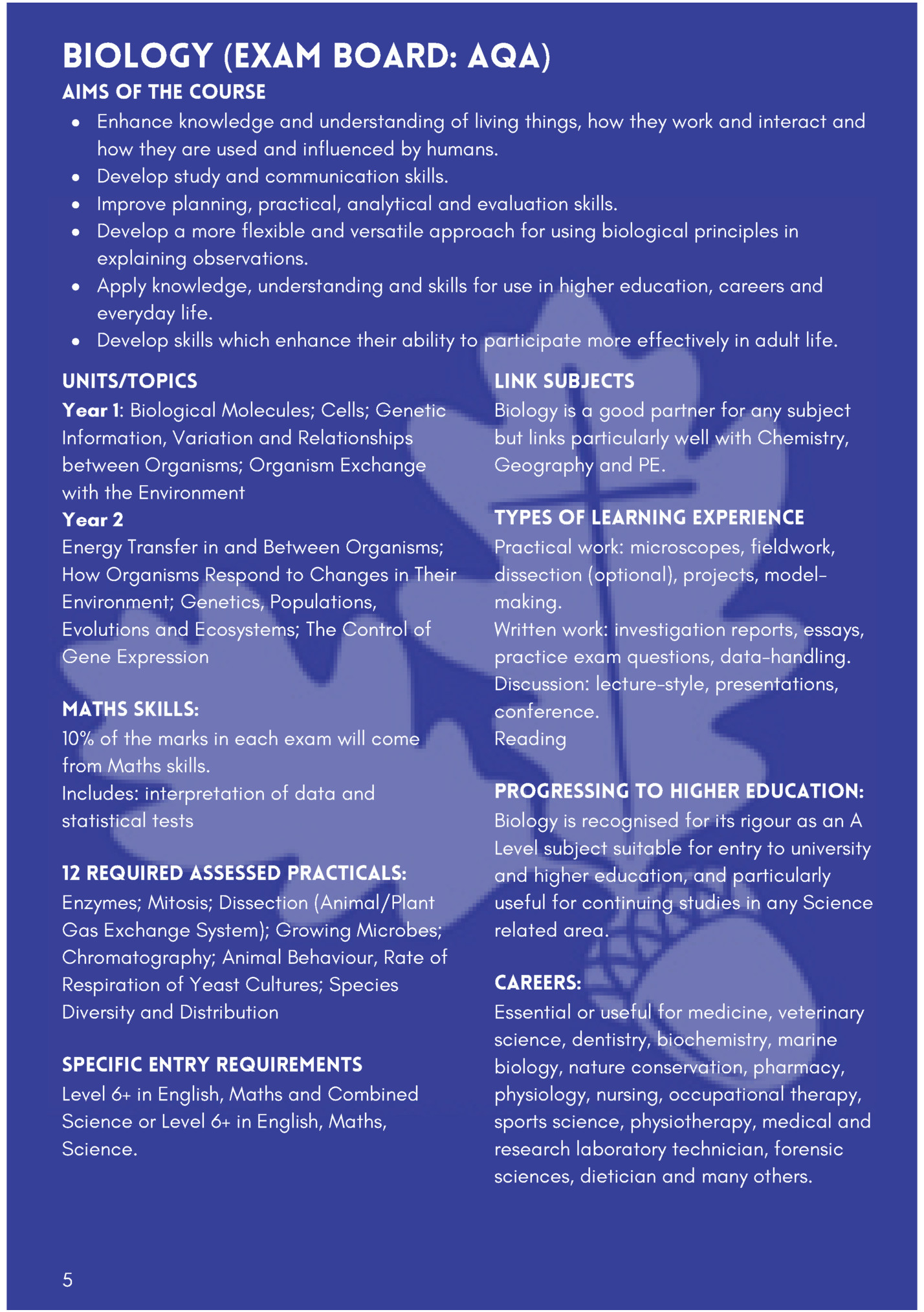
will: Develop a broad knowledge base in Biology by regularly going over lesson material, reading biological material related to the current affairs, watching relevant videos, reading the A Level Biological Sciences review magazine and popular science books from the lab. Develop good communication skills by using the guidance for planning investigations, writing investigation reports and longer-answer questions provided on Show My Homework and the One Drive shared area. They will lay out their written work in a logical, sequential and coherent manner, using appropriate scientific terminology to explain and justify points made. Develop analytical and mathematical skills by using the guidance for plotting graphs and carrying out suitable statistical testing provided on Show My Homework and the OneDrive shared area. They will show their working in a thorough and organised manner, and be able to use it in the concluding processes. Develop effective revision techniques by allowing sufficient time to memorise large quantities of factual material, use online resources to practise exam-style questions, listen to and act on feedback provided to develop exam technique, and adopt a very persistent approach to preparing for exams. Develop practical skills by being attentive to instructions and being aware of their own safety and that of others. They will be able to plan and carry out practical tasks independently, and select appropriate equipment for these tasks to allow data to be successfully generated for analysis. assessment - AQA 3 Papers (all 2 hours) Paper 1: 35% of A Level. Year 1 Content. Paper 2: 35% of A Level. Year 1 and Year 2 Content Paper 3: 30% of A Level. Practical skills and a 25-mark synoptic essay Silver or Gold CREST Awards: CREST helps young people become independent and reflective learners. CREST is respected by universities and employers and enhances students’ UCAS personal statements through enquiry-based project work. Find our more about CREST at: https://www.crestawards.org 6
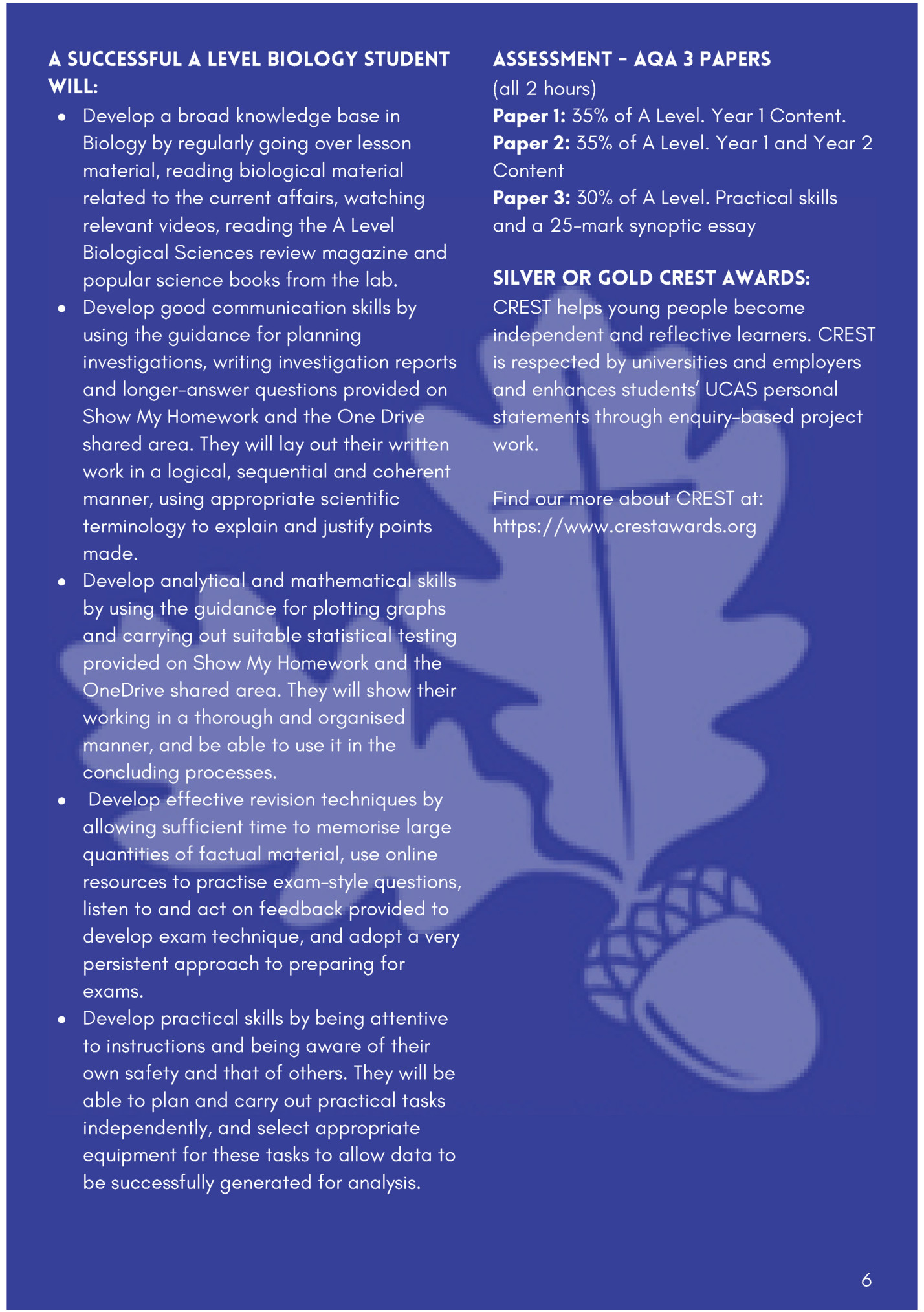
Aims of the Course Develop an enthusiasm for studying business and acquire relevant business and generic skills, including decision-making, problem-solving and application of numerical skills. Gain a holistic understanding of business in a range of contexts. Develop a critical understanding of organisations and their ability to meet society’s needs and wants. Understand that business behaviour can be studied from a range of perspectives. Generate enterprising and creative approaches to business opportunities, problems and issues. Be aware of the ethical dilemmas and responsibilities faced by organisations and individuals. The challenging of assumptions and critical analysis. Apply numerical skills in a range of business contexts. Units/Topics What is business? Managers, leadership and decision making Decision making to improve marketing performance Decision making to improve operational performance Decision making to improve financial performance Decision making to improve human resource performance Analysing the strategic position of a business Choosing strategic direction Strategic methods: how to pursue strategies Types of Learning Experience Students will study three units to achieve an A Level in two years. Facts, figures and research evidence are gained through lectures, seminars, classroom discussion, personal reading books, journals, newspapers, videos and TV documentaries. There is an opportunity to attend national conferences and visits may be organised to local companies. 7 assessment - AQA 3 Papers (all 2 hours each) 100 marks each 33.3% of A Level each Progressing to higher education: Business Studies combines well with English, Modern Languages, Geography and Mathematics as a basis for entry to a wide variety of business related degrees and qualifications. Careers: A Level Business Studies is undoubtedly an asset whether students decide to seek employment or decide to proceed to higher education, providing a valuable background understanding for careers in the private or public sector such as finance, banking, local government, travel and charities.
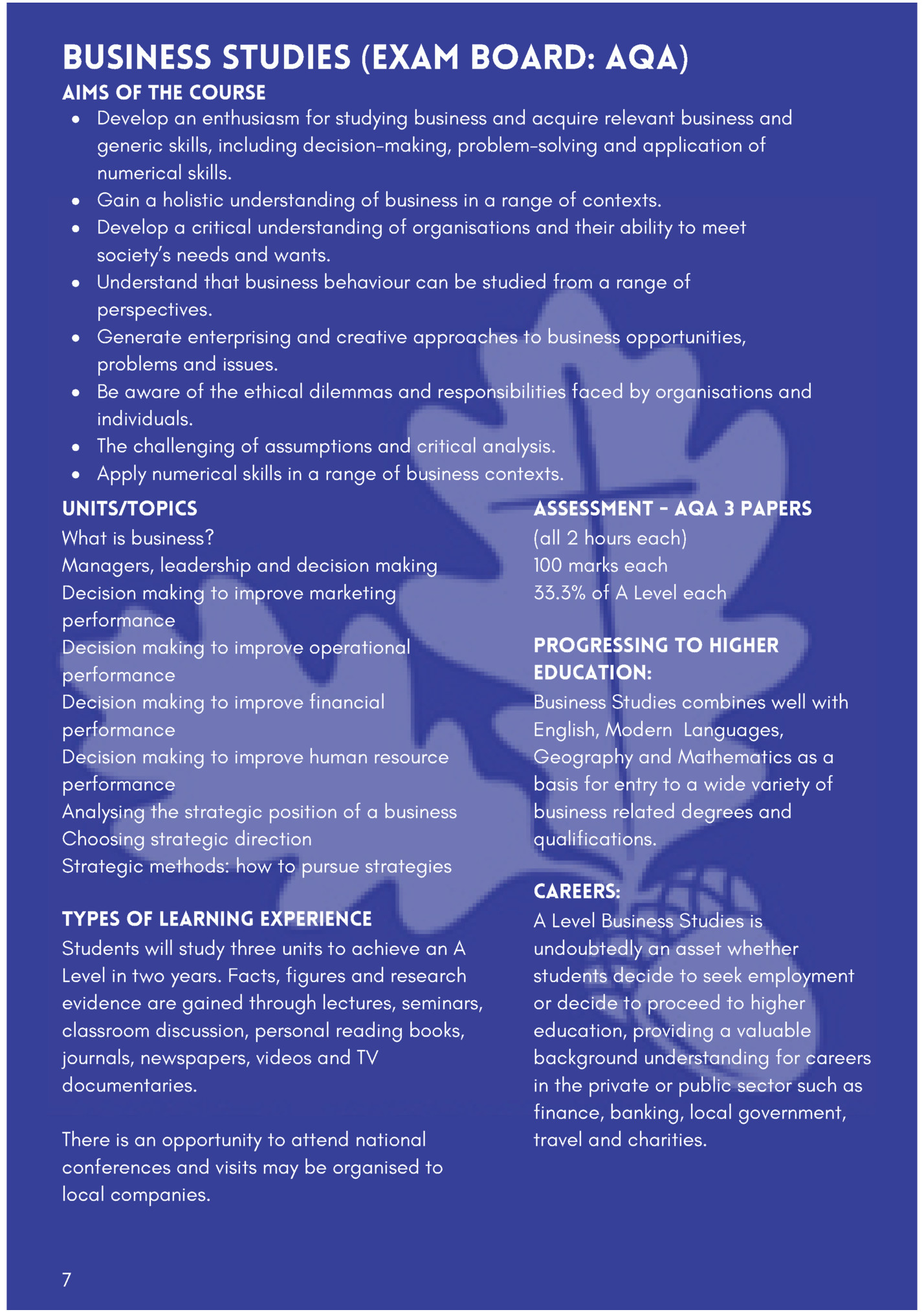
Aims of the Course Make decisions about the way chemistry affects everyday life by applying concepts to contemporary areas of chemistry, including climate change, green chemistry and pharmaceuticals. Develop a range of generic skills requested by employers and universities, such as problem-solving, oral and written communication, bundling data and ICT. Build up a range of practical skills that require creativity and accuracy and develop a firm understanding of Health and Safety issues. Work effectively as part of a group, developing team participation and leadership skills. Take responsibility for selecting appropriate qualitative and quantitative methods, recording your observations accurately and precisely, and critically analysing and evaluating the methodology, results and impact of your own and others' experimental and investigative activities. Units/Topics Paper 1: Inorganic chemistry; Atomic structure; Amount of substance; Bonding; Energetics; Equilibria; Acids and bases; Redox; Relevant practical skills Paper 2: Organic chemistry; Amounts of Substance; Bonding; Energetics; Equilibria; Kinetics; Relevant practical skills Paper 3: all content and practical skills specific entry requirements A minimum of grades 7, 6, 6 in any order in GCSE Science and Maths is required. Link Subjects Chemistry may be taken with any combination of subjects, but is particularly complemented by subjects such as Biology, Physics, Mathematics or Geography. assessment - AQA 3 Papers (all 2 hours each) Paper 1: 35% of A Level. 105 marks Paper 2: 35% of A Level. 105 marks Paper 3: 90 marks Types of learning experience Students will study two modules in Year 12 and complete core practicals to develop laboratory skills. A similar structure also applies in Year 13 with progressing to higher education: laboratory skills assessed in a third exam An A Level in Chemistry is essential for courses paper. Lessons will vary in format from such as Medicine, Veterinary Science, lecture style to research, independent Pharmacy, Dentistry and Chemical Engineering. learning, practical and investigative work. Students are expected to keep a Careers: coherent folder of notes, exercises and Whilst many job opportunities specifically using practical write-ups throughout the Chemistry require higher qualifications, most course. Background reading should be laboratory based jobs benefit from a Chemistry done on a regular basis as well as qualification, for instance dental assistant or keeping up to date with current trends by veterinary assistant. Many employers view watching relevant TV programmes and success at A Level Chemistry as a clear reading science magazines. indication of sound academic ability. 8
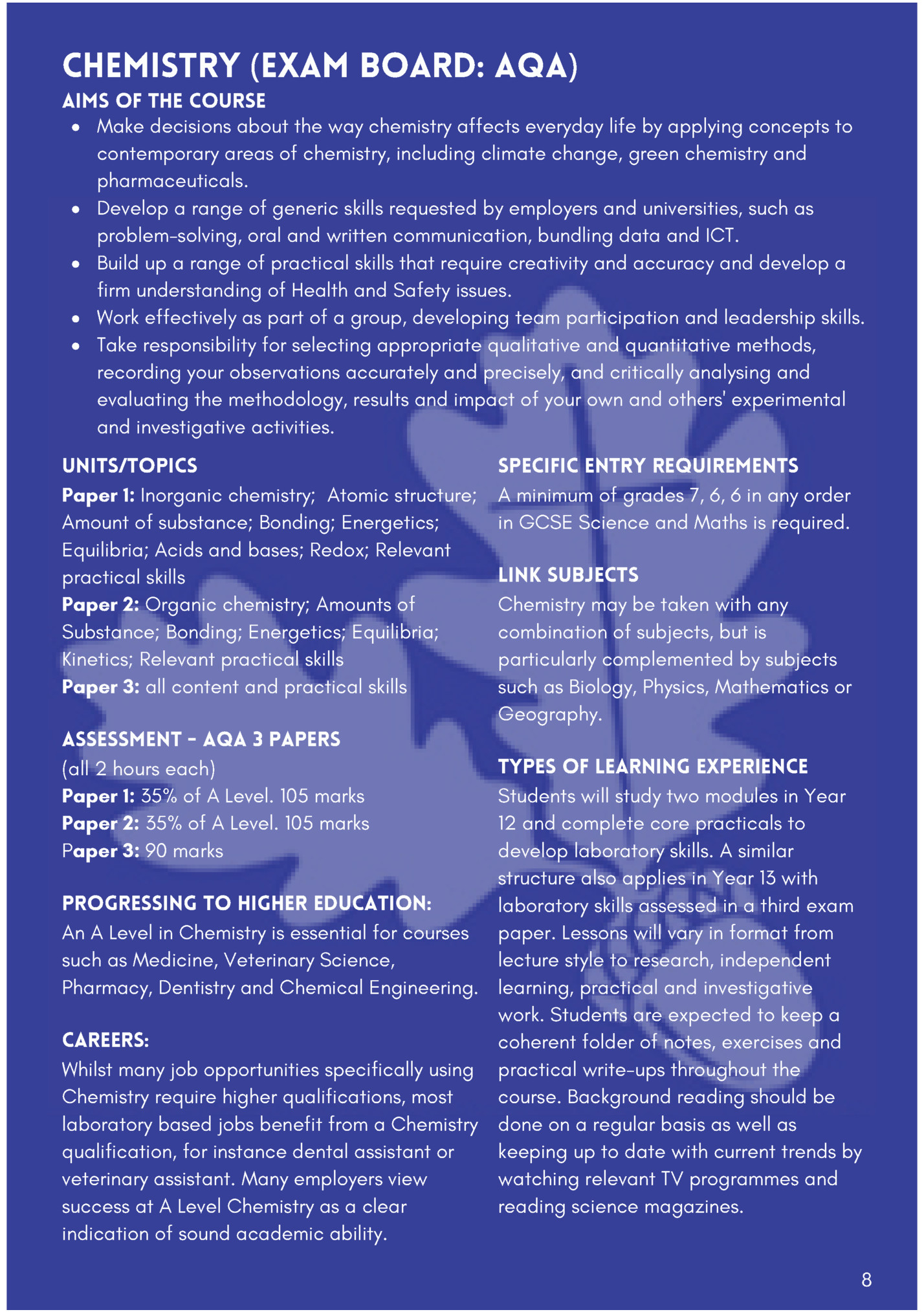
Fleepit Digital © 2021